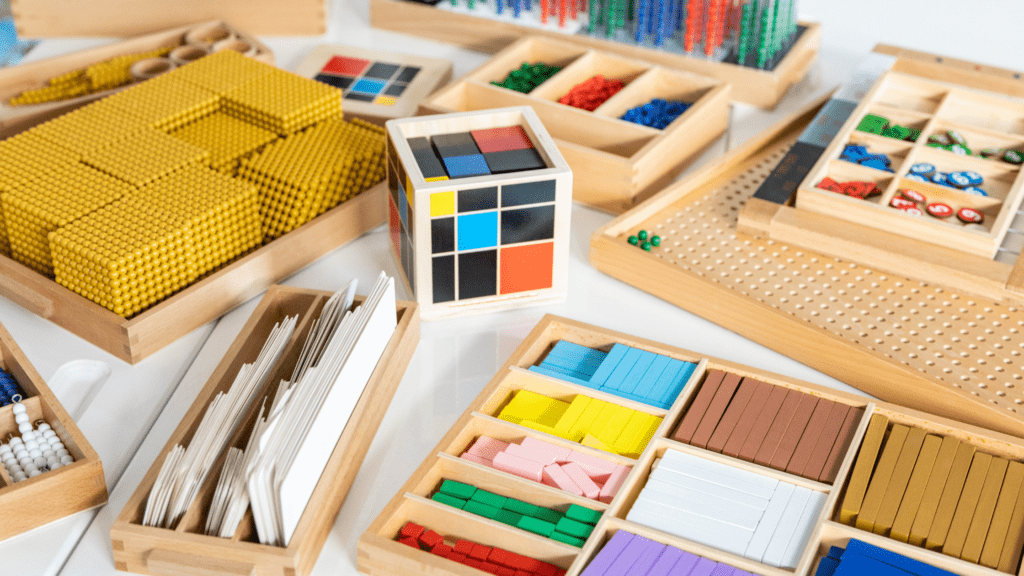Numeracy is a fundamental skill that lays the groundwork for a child’s mathematical understanding. In the Montessori education method, math concepts are introduced through a variety of hands-on materials, which engage children in active learning experiences. This article explores the key Montessori math materials and their role in developing number sense and mathematical proficiency. By understanding how these materials are used and incorporating practical examples and activities, parents, and educators can support children’s math learning journey in a meaningful and enjoyable way.
Montessori Math Materials and Their Importance
In Montessori classrooms, math materials are carefully designed to facilitate concrete and abstract learning experiences, enabling children to grasp mathematical concepts more effectively. This article discusses the significance of Montessori math materials and their role in building a strong foundation in numeracy.
1. Concrete Learning
Montessori math materials are based on real objects and experiences, making learning more tangible and relatable. Children can use these materials to explore mathematical concepts using their senses, which helps them better understand and remember what they learn.
2. Multi-Sensory Learning
Montessori math materials engage multiple senses at once, making learning more effective. These materials are visually appealing, tactile, and auditory, providing a fun and engaging way to learn.
3. Self-Correction
Montessori math materials are self-correcting, allowing children to review their work. This helps them learn from their mistakes, become more independent learners, and build confidence in their abilities.
4. Sequential Learning
Montessori math materials are used in a specific sequence based on the natural progression of mathematical concepts. This helps children build a strong foundation in math and better understand how different concepts are related to one another.
5. Individualized Learning
Montessori math materials are designed for individual or small group use, allowing children to work at their own pace and level. This helps them explore mathematical concepts in a way that is meaningful to them, building a deeper understanding of math.
List of 20 Montessori Math Materials That Help a Child Develop Essential Math Skills
1. Number Rods: Exploring Length and Quantity
The Number Rods are essential Montessori math materials. Varying in length from one to ten units, they provide a visual representation of numbers and introduce the concept of length and quantity.
2. Spindle Box: Counting and Numerical Sequence
The Spindle Box is a fascinating math material that aids children in mastering numerical sequence and counting skills. It introduces the concept of zero and enhances their understanding of number order while reinforcing their counting abilities.
3. Golden Beads
Golden Bead bars help children learn the concept of place value, addition, subtraction, multiplication, and division. They provide a concrete representation of quantities and lay the foundation for basic operations.
4. Sandpaper Numbers
Sandpaper numbers teach number formation, and recognition, and help develop a tactile understanding of numeral symbols. They further prepare hands for writing.
5. Number Cards and Counters
Number cards and counters help children in number recognition by teaching one-to-one correspondence, numeral recognition, and counting. They also develop numeral-symbol associations.
6. Teen and Ten Boards
Ten boards introduce the concept of teens and tens, number sequencing, and place value. They reinforce understanding of the decimal system.
7. Bead Chains:
Bead chains are an extension of colored bead bars. They teach children about the concept of skip counting, and multiplication tables, and reinforce the concept of units, tens, hundreds, etc. They also develop numerical patterns and sequence recognition.
8. Hundred Boards:
A hundred boards are an extension of ten boards. They teach children number recognition, counting, and pattern recognition. They reinforce the concept of the decimal system and develop visual-spatial skills.
9. Snake Game:
The Snake Game helps children learn how to do addition, subtraction, multiplication, and division. It provides a concrete and dynamic approach to understanding mathematical operations.
10. Stamp Game:
The Stamp Game is an interesting mathematical game that introduces children to stamps of units, tens, hundreds, and thousands. It teaches the concept of addition, subtraction, multiplication, and division with a more abstract representation of quantities. It also reinforces the understanding of place value.
11. Decimal Checkerboard:
The Decimal Checkerboard helps children learn the difficult concept of multiplication and reinforces the concept of place value. It also develops problem-solving skills and logical thinking.
12. Bank Game:
The Bank Game is a Montessori math material that teaches addition, subtraction, multiplication, and division with larger numbers. It introduces the concept of exchanging between larger and smaller quantities, similar to how banks operate, and reinforces the concept of place value.
13. Fraction Insets:
Fraction Insets teach the concept of fractions, their representation, and equivalence. They develop fraction recognition and understanding using pie cutouts.
14. Decimal Fraction Board:
The Decimal Fraction Board teaches the concept of decimal fractions and their relationship to whole numbers. It further develops decimal fraction recognition and equivalence.
15. Racks and Tubes:
Racks and Tubes help children learn the concept of long multiplication and long division in a more concrete manner. They help develop an understanding of algorithms and reinforce the concept of place value.
16. Bead Frame:
The Bead Frame helps children learn dynamic addition, subtraction, multiplication, and division with carrying and borrowing. It reinforces the concept of place value and develops mathematical operations.
17. Clock:
The Clock, like in traditional education, teaches the concept of time-telling, understanding hours and minutes, and developing a sense of time. It helps children with numeral recognition and understanding of the number system.
18. Geometry Cabinet:
The Geometric Cabinet is a Montessori sensorial material that teaches geometric shapes, their attributes and develops visual discrimination and spatial awareness.
19. Geometric Solids:
Geometric Solids introduce children to three-dimensional shapes and their properties. They also develop spatial reasoning and an understanding of geometric concepts.
20. Fraction Circles:
Fraction Circles are famous Montessori math material to teach fraction concepts. The fraction cutouts not only teach fraction recognition, equivalence, and operations but also develop an understanding of fractional concepts and problem-solving skills.
There are additional Montessori math materials and variations of existing materials that build on these concepts, but this overview provides a glimpse into the intentionally structured curriculum that a child encounters in a Montessori classroom.
Conclusion
In conclusion, the power of Montessori math materials in transforming a child’s mathematical journey is undeniable. From counting to complex calculations, these carefully designed materials provide a solid foundation for mathematical understanding and critical thinking skills. The hands-on nature of Montessori math materials, engages children in active learning, allowing them to explore concepts, discover patterns, and develop a deep sense of number sense and mathematical fluency.
So, let us embark on this exciting journey of counting to calculations with Montessori math materials, empowering children to not only conquer mathematical challenges but also develop a lifelong appreciation for the wonders of mathematics.

